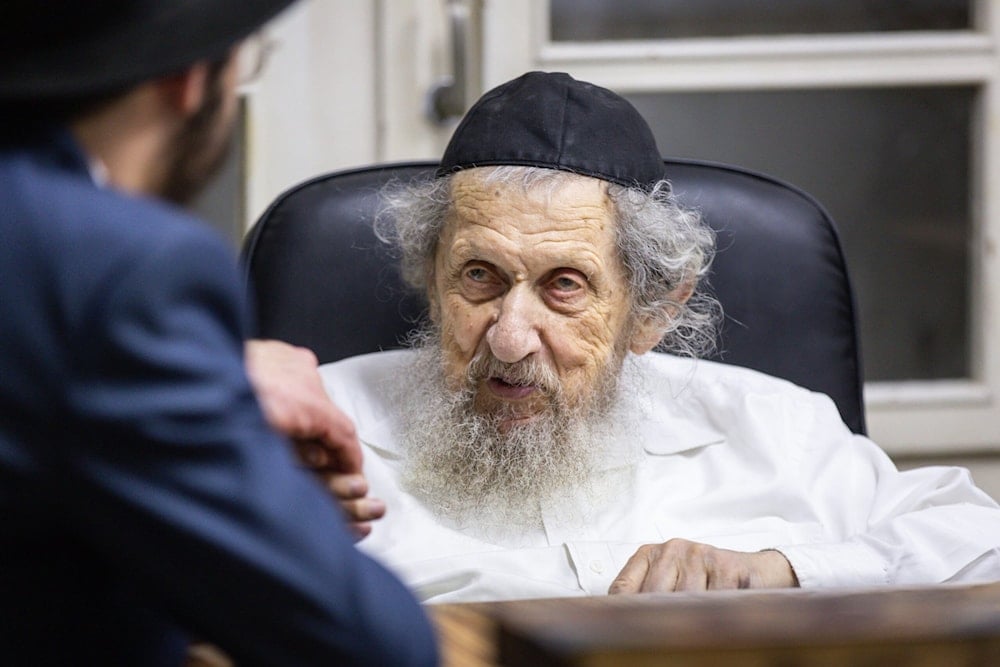Ultra-Orthodox rabbi urges followers to leave Zionist institutions
Israeli Rabbi Dov Landau directed Degel HaTorah representatives to withdraw from Zionist institutions, arguing that Zionism is a secular movement that contradicts traditional Jewish values.
-

Rabbi Dov Lando, leader of the Degel HaTorah party, undated (Social media)
On Tuesday, the Jerusalem Post reported that Rabbi Dov Landau, a senior figure in the Lithuanian ultra-Orthodox community in "Israel," instructed representatives of the Degel HaTorah political party to withdraw from all Zionist institutions due to deep ideological differences with the secular foundations of Zionism.
In a letter published today in the ultra-Orthodox daily Yated Ne'eman, Landau wrote, "Zionism is a movement whose purpose is to establish the Jewish people on an explicitly secular foundation, rooted in heresy and rebellion against divine sovereignty," adding, "There is no allowance to participate with them, serve in any role within their institutions, or vote in their elections in any form whatsoever."
He emphasized that participating in these institutions supports beliefs that "contradict traditional Jewish values, warning that it results in the desecration of God's name."
'A change in Zionist dynamics'
The Jerusalem Post explains that Landau's statement comes amid wider discussions about the role of ultra-Orthodox and religious communities in Zionist institutions. It notes that the World Zionist Organization (WZO), established in 1897 by Theodor Herzl, oversees key institutions like the Jewish Agency for Israel, the Jewish National Fund (JNF), and Keren Hayesod.
The report notes a growing influence of religious, right-wing factions within these institutions in recent years. It highlights that in the 2020 elections for the 38th World Zionist Congress (WZC), Orthodox groups made significant gains, with the Eretz HaKodesh faction—a coalition of conservative religious-Zionist and ultra-Orthodox figures—securing over 20,000 votes.
However, their platform notably refrained from using the terms "Zionist" or "State of Israel," assuring potential voters that participating in WZO elections did not signify "ideological support for Zionism."
Theological divide
The Jerusalem Post reported that Landau’s opposition to Zionist institutions stems from long-standing ultra-Orthodox theology, which rejects Zionism as a "secular-nationalist movement."
In his letter, he stated that Zionism is based on "heresy and rebellion against divine sovereignty", and participating in its institutions supports this ideology.
Read next: The final stage is the end of Zionism: Haaretz
He clarified that while participation in Israeli elections is allowed to protect the religious character of the state, involvement in the Zionist Organization is incompatible with religious principles.
Implications for Degel HaTorah
According to the report, Degel HaTorah’s decision to withdraw from Zionist institutions could have practical consequences for its role within the United Torah Judaism (UTJ) faction in the Knesset.
The report also noted that Degel HaTorah's future participation in international Jewish forums, such as the World Zionist Congress (WZC), is uncertain following this directive.
The WZC, which convenes every five years, plays a significant role in directing billions of dollars in funding for Zionist initiatives globally.
Read next: Boiling pot: 'Israel's' ideological discord

 3 Min Read
3 Min Read










